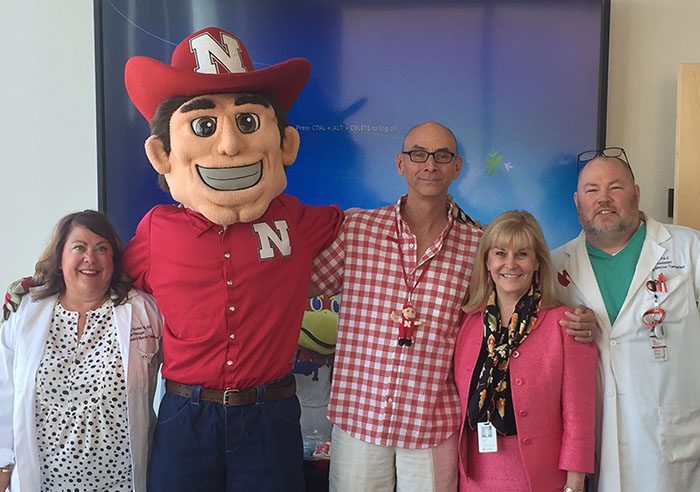Cancer survivor’s generosity benefits UNMC and others who’ve helped him
Steve Sears has been highly successful in his life.
After receiving his undergraduate degree in accounting from the University of Kansas, he went to Northwestern University’s Kellogg School of Management to get his M.B.A. He was hired by PepsiCo shortly after graduating and spent two decades managing the world’s most well-known brands.
He was the chief marketing officer for Frito-Lay in Sidney, Australia, and head of marketing for the Pepsi beverage brands in New York, and he oversaw the acquisition of Stacy’s Pita Chips in Boston.
On his 50th birthday, Steve retired from his marketing career. One month later, he was diagnosed with cancer.
It was Hodgkin lymphoma, stage 4, the most advanced in the disease’s progression. Steve had experienced symptoms for months, but he hadn’t been accurately diagnosed, so the cancer had continued its steady march, coursing through his blood and, ultimately, his organs.
At the time, Steve and his husband were in the process of moving from Boston to Kansas City, where Steve had grown up and his parents still lived. But they decided to stay and seek treatment at Beth Israel Deaconess Medical Center, the teaching hospital of Harvard Medical School, where Steve’s doctor was affiliated. Six months of grueling chemotherapy, and Steve was in full remission.
The move to Kansas City went forward, and Steve’s post-treatment care was set up with the University of Kansas Cancer Center. But at his six-month checkup, Steve was told the cancer was back. It was devastating news.
When cancer, specifically lymphoma or leukemia, returns so quickly, a stem cell transplant is often the best course, and that’s what Steve’s doctor recommended.
Steve quickly educated himself on the procedure and prepared for it. But a week before the transplant, Steve received a call from the cancer center’s finance department. His insurance was not affiliated with KU, and his treatment could not be authorized. It was a sinking feeling, but Steve was told a highly rated facility could take him: the University of Nebraska Medical Center.
The following day, Steve received a call from UNMC saying Julie Vose, M.D., the chief of the division of oncology/ hematology and an internationally known expert on lymphoma, could see him the next day. He drove to Omaha, and from the moment he stepped through the doors and into the waiting room, he felt the warmth of the people who would be his caregivers and life-savers over the next several weeks.
Steve spent five weeks in Omaha, and today, he is six years in remission. When he looks back at the experience, he believes it turned out for the best. Even the fact that the hospital was three hours from home turned out to be a blessing. “My husband and I just kind of sequestered ourselves in Omaha,” he said.
Most importantly, Steve received first-class care, a successful treatment — and kindness.
“You’re so stressed out when you have a life-threatening diagnosis,” he said, “and it’s just so comforting to turn your life over to people who not only do you trust for their technical skills but also who have empathy and just general kindness and humor.”
There were, of course, low points and stressful times during his treatment. But that’s not what Steve remembers. He remembers the people he met, a few in particular: Dr. Vose, his primary physician, Stacy Rooker, his case manager, and a nurse practitioner named Mark Brown.
Mark and Steve had only one interaction, but it came on a difficult day. Steve was feeling frustrated and downhearted, and Mark lifted his spirits. “He spent probably 10 minutes with me,” Steve said, but after Mark walked out, “I felt like a new person, and I never forgot that. It was like he was my angel that day.”
On the fifth anniversary of his transplant, Steve worked with the University of Nebraska Foundation to throw a surprise reception for the three people who had most impacted him during his treatment. He also announced a generous estate gift to support cancer research at UNMC.
UNMC is not the only beneficiary of Steve’s generosity. When planning his estate, he thought about everyone who helped him succeed in his career and find happiness in his personal life.
“It’s been one of my life’s great joys to get that plan together and then have the fun of going around and telling the organizations in the plan that they’re going to receive a gift someday — hopefully many, many years from now — and see the excitement and appreciation that they have.”
Steve has been highly successful in his life. And that has enabled him to give back to the causes that matter to him. But the people who enabled his success saved his life and showed him compassion — those are the ones who inspired him to do so.
"It’s been one of my life’s great joys to get that plan together and then have the fun of going around and telling the organizations in the plan that they’re going to receive a gift someday — hopefully many, many years from now — and see the excitement and appreciation that they have."
Steve Sears
You may also like ...
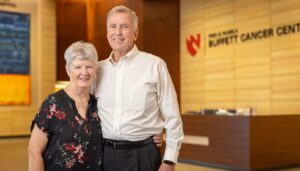
‘I’m so thankful:’ Nebraska family reflects on care, second chance
“Thanks to the doctors like Dr. Lunning and the entire staff at Nebraska Medicine, I’ve been given another decade with my husband.”
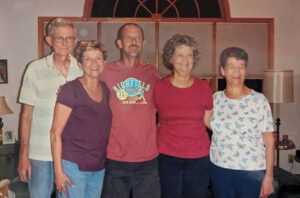
Fighting Cancer by Giving Back
After several family members fought and succumbed to cancer, Doris Jones decided to give back to future generations by supporting cancer research.

Missouri Native Becomes A Husker Fan
Burnett Society member Paul Garnett has been a loyal Husker Athletics fan ever since he moved to Nebraska from his home state of Missouri nearly 49 years ago.



